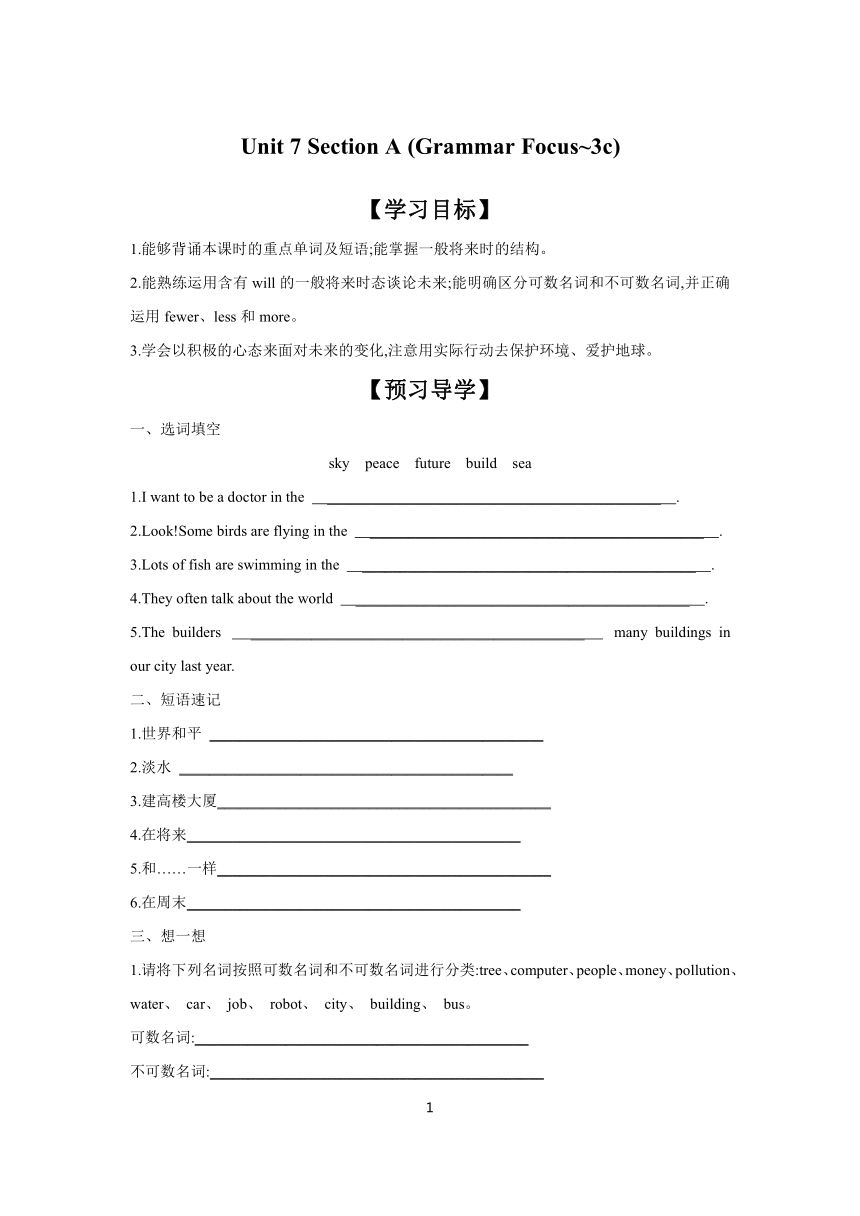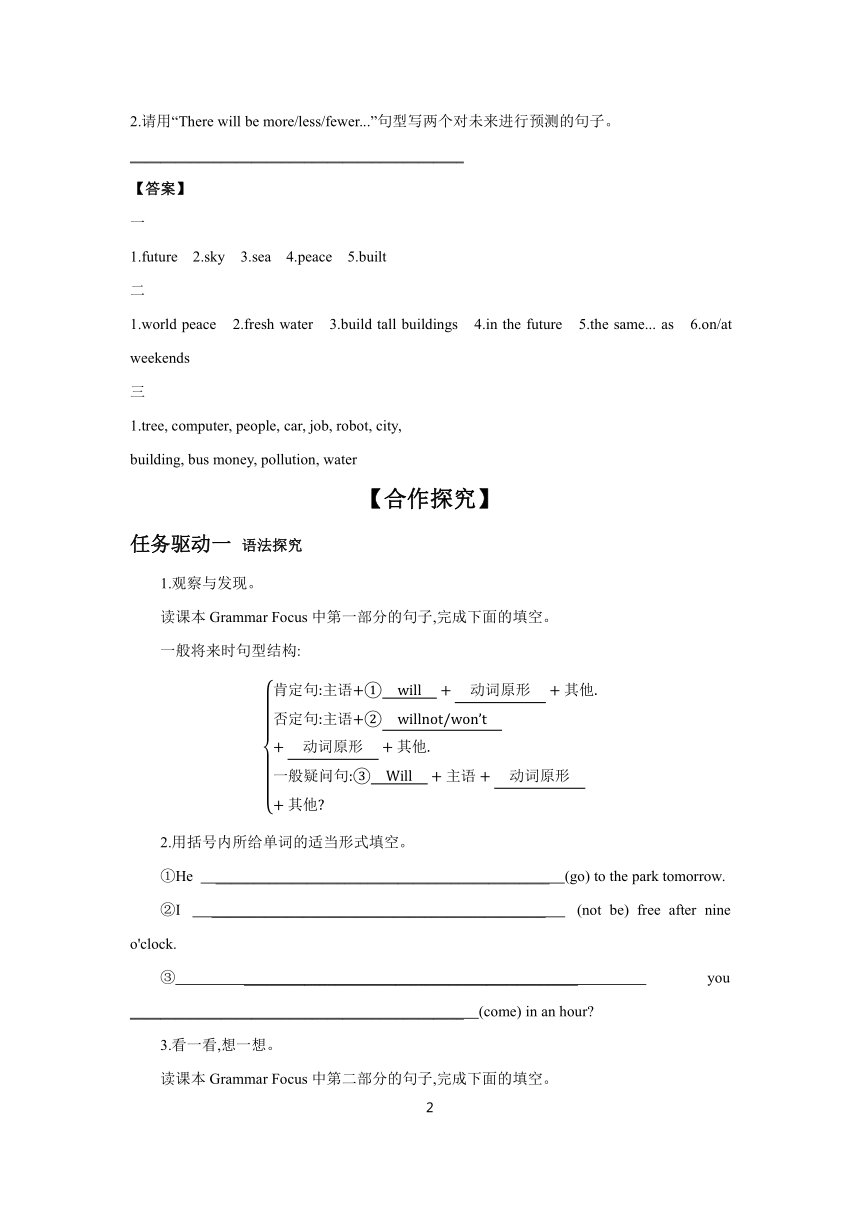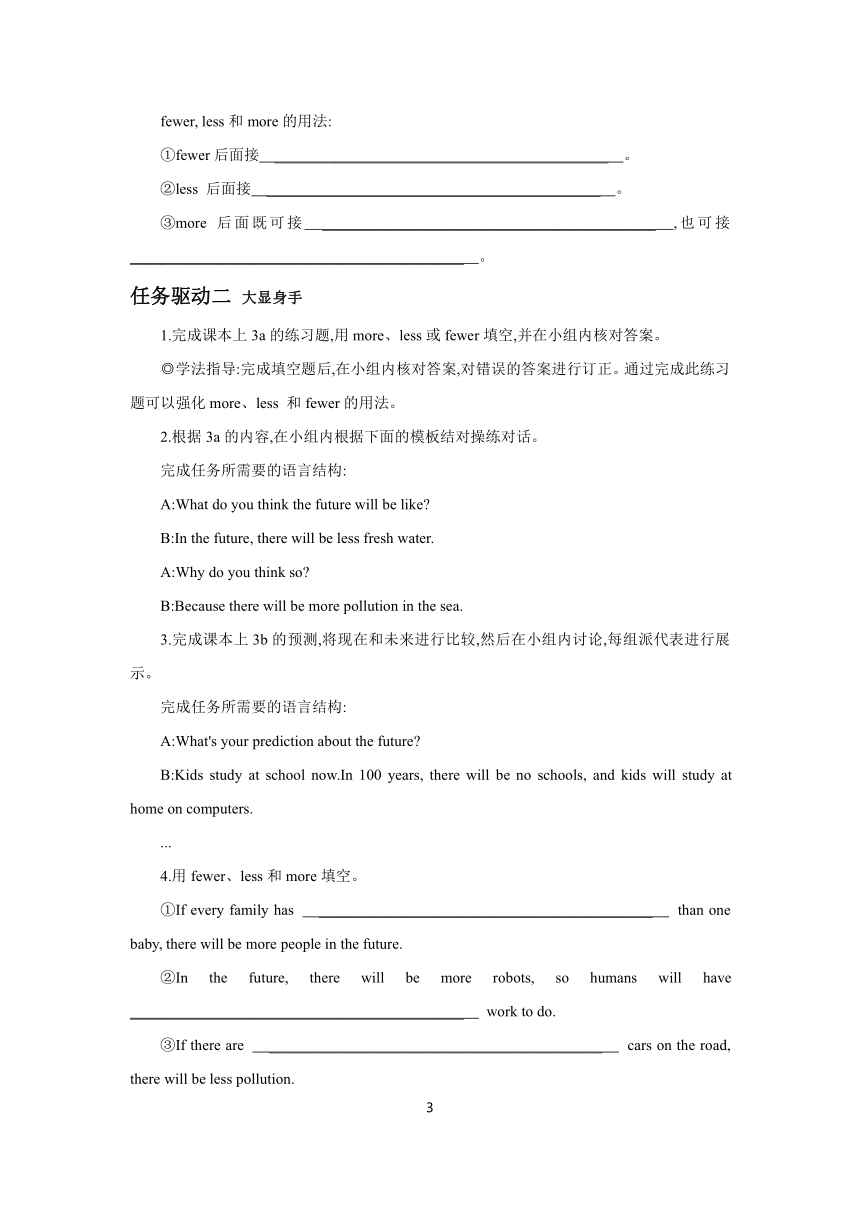Unit 7 Will people have robots?Section A (Grammar Focus-3c) 学案 2023-2024学年人教版八年级上册
文档属性
| 名称 | Unit 7 Will people have robots?Section A (Grammar Focus-3c) 学案 2023-2024学年人教版八年级上册 |  | |
| 格式 | docx | ||
| 文件大小 | 25.5KB | ||
| 资源类型 | 教案 | ||
| 版本资源 | 人教新目标(Go for it)版 | ||
| 科目 | 英语 | ||
| 更新时间 | 2024-02-22 15:59:39 | ||
图片预览



文档简介
Unit 7 Section A (Grammar Focus~3c)
【学习目标】
1.能够背诵本课时的重点单词及短语;能掌握一般将来时的结构。
2.能熟练运用含有will的一般将来时态谈论未来;能明确区分可数名词和不可数名词,并正确运用fewer、less和more。
3.学会以积极的心态来面对未来的变化,注意用实际行动去保护环境、爱护地球。
【预习导学】
一、选词填空
sky peace future build sea
1.I want to be a doctor in the ____________________________________________ .
2.Look!Some birds are flying in the ____________________________________________ .
3.Lots of fish are swimming in the ____________________________________________ .
4.They often talk about the world ____________________________________________ .
5.The builders ____________________________________________ many buildings in our city last year.
二、短语速记
1.世界和平 ____________________________________________
2.淡水 ____________________________________________
3.建高楼大厦____________________________________________
4.在将来____________________________________________
5.和……一样____________________________________________
6.在周末____________________________________________
三、想一想
1.请将下列名词按照可数名词和不可数名词进行分类:tree、computer、people、money、pollution、water、 car、 job、 robot、 city、 building、 bus。
可数名词:____________________________________________
不可数名词:____________________________________________
2.请用“There will be more/less/fewer...”句型写两个对未来进行预测的句子。
____________________________________________
【答案】
一
1.future 2.sky 3.sea 4.peace 5.built
二
1.world peace 2.fresh water 3.build tall buildings 4.in the future 5.the same... as 6.on/at weekends
三
1.tree, computer, people, car, job, robot, city,
building, bus money, pollution, water
【合作探究】
任务驱动一 语法探究
1.观察与发现。
读课本Grammar Focus中第一部分的句子,完成下面的填空。
一般将来时句型结构:
2.用括号内所给单词的适当形式填空。
①He ____________________________________________ (go) to the park tomorrow.
②I ____________________________________________ (not be) free after nine o'clock.
③ ____________________________________________ you ____________________________________________ (come) in an hour
3.看一看,想一想。
读课本Grammar Focus中第二部分的句子,完成下面的填空。
fewer, less和more的用法:
①fewer后面接 ____________________________________________ 。
②less 后面接 ____________________________________________ 。
③more 后面既可接 ____________________________________________ ,也可接 ____________________________________________ 。
任务驱动二 大显身手
1.完成课本上3a的练习题,用more、less或fewer填空,并在小组内核对答案。
◎学法指导:完成填空题后,在小组内核对答案,对错误的答案进行订正。通过完成此练习题可以强化more、less 和fewer的用法。
2.根据3a的内容,在小组内根据下面的模板结对操练对话。
完成任务所需要的语言结构:
A:What do you think the future will be like
B:In the future, there will be less fresh water.
A:Why do you think so
B:Because there will be more pollution in the sea.
3.完成课本上3b的预测,将现在和未来进行比较,然后在小组内讨论,每组派代表进行展示。
完成任务所需要的语言结构:
A:What's your prediction about the future
B:Kids study at school now.In 100 years, there will be no schools, and kids will study at home on computers.
...
4.用fewer、less和more填空。
①If every family has ____________________________________________ than one baby, there will be more people in the future.
②In the future, there will be more robots, so humans will have ____________________________________________ work to do.
③If there are ____________________________________________ cars on the road, there will be less pollution.
④Lucy gets better grades than Lily, because Lucy is ____________________________________________ hard-working than Lily.
任务驱动三 描绘未来
1.画一幅画描绘你们城市未来的样子。
2.用一篇小短文描述你所画的城市。
完成任务所需要的语言结构:
This is the picture of our city. In the future, there will be...in our city. The people will...
【答案】
任务驱动一
1.①will 动词原形
②will not/ won't 动词原形
③Will 动词原形
2.①will go ②will not/won't be ③Will come
3.①可数名词复数 ②不可数名词 ③可数名词复数 不可数名词
任务驱动二
4.①more ②less ③fewer ④more
【知识超市】
[命题点一]What will the future be like 未来会是什么样子
◎观察思考:1.His parents will go to Wuhan next Saturday.下周六他的父母将会去武汉。
2.Alice won't be late for school tomorrow.Alice明天上学不会迟到。
3.—Will she go to the party 她会去参加聚会吗
—Yes, she will./No, she won't.是的,她会去。/不,她不会去。
4.Where will you go this weekend 这个周末你要去哪里
5.There will be no paper money in the future.未来将不会有纸币。
6.Shen Hong is leaving for Shandong next week.沈红下周将要动身前往山东。
◎用法总结:一般将来时
1.定义:一般将来时表示将来某个时间要发生的动作或存在的状态,也表示将来经常或反复发生的动作,常与表示将来的时间状语连用,如:tomorrow、the day after tomorrow、in the future、in ten years、next week等。
2.构成:will/shall+动词原形 (shall用于第一人称,will用于各种人称)。
3.其他表示一般将来时的结构。
(1) be going to+动词原形
该句式往往表示计划、打算、决定要做的事或将要发生的事。其中be有人称和数的变化,即am, is, are。如:
I am going to watch a movie.我打算看电影。
(2)表示移动性的瞬间动词come, go, leave, start, begin等常用现在进行时表将来意义。如:
The bus is arriving at 9:00 a.m.公交车将于早上9点到达。
对点自测
用括号内所给单词的适当形式填空。
1.I ____________________________________________ (fly) to Guangzhou soon.
2.Bob and I ____________________________________________ (watch) an action movie tomorrow.
3.Mark ____________________________________________ (not have) any classes next week.
4.There ____________________________________________ (be) a meeting tomorrow afternoon.
5.The train is ____________________________________________ (come).
【答案】1.am flying 2.will watch 3.won't have 4.will be 5.coming
[命题点二]There will be fewer jobs for people because more robots will do the same jobs as people.对于人们来说将会有更少的工作,因为更多的机器人将会做和人们一样的工作。
◎用法总结:the same...as...意为“同……一样……”,其反义短语是be different from...,意为“与……不同”。
对点自测
按要求完成下列各题。
1.My bag is different from his.(改为同义句)
My bag ____________________________ ________________ _______________________________ _________________________________ his.
2.这件衬衫同我昨天买的那件一样。(汉译英)
____________________________________________
【答案】1.isn't the same as
2.This shirt is the same as I bought yesterday.
2
【学习目标】
1.能够背诵本课时的重点单词及短语;能掌握一般将来时的结构。
2.能熟练运用含有will的一般将来时态谈论未来;能明确区分可数名词和不可数名词,并正确运用fewer、less和more。
3.学会以积极的心态来面对未来的变化,注意用实际行动去保护环境、爱护地球。
【预习导学】
一、选词填空
sky peace future build sea
1.I want to be a doctor in the ____________________________________________ .
2.Look!Some birds are flying in the ____________________________________________ .
3.Lots of fish are swimming in the ____________________________________________ .
4.They often talk about the world ____________________________________________ .
5.The builders ____________________________________________ many buildings in our city last year.
二、短语速记
1.世界和平 ____________________________________________
2.淡水 ____________________________________________
3.建高楼大厦____________________________________________
4.在将来____________________________________________
5.和……一样____________________________________________
6.在周末____________________________________________
三、想一想
1.请将下列名词按照可数名词和不可数名词进行分类:tree、computer、people、money、pollution、water、 car、 job、 robot、 city、 building、 bus。
可数名词:____________________________________________
不可数名词:____________________________________________
2.请用“There will be more/less/fewer...”句型写两个对未来进行预测的句子。
____________________________________________
【答案】
一
1.future 2.sky 3.sea 4.peace 5.built
二
1.world peace 2.fresh water 3.build tall buildings 4.in the future 5.the same... as 6.on/at weekends
三
1.tree, computer, people, car, job, robot, city,
building, bus money, pollution, water
【合作探究】
任务驱动一 语法探究
1.观察与发现。
读课本Grammar Focus中第一部分的句子,完成下面的填空。
一般将来时句型结构:
2.用括号内所给单词的适当形式填空。
①He ____________________________________________ (go) to the park tomorrow.
②I ____________________________________________ (not be) free after nine o'clock.
③ ____________________________________________ you ____________________________________________ (come) in an hour
3.看一看,想一想。
读课本Grammar Focus中第二部分的句子,完成下面的填空。
fewer, less和more的用法:
①fewer后面接 ____________________________________________ 。
②less 后面接 ____________________________________________ 。
③more 后面既可接 ____________________________________________ ,也可接 ____________________________________________ 。
任务驱动二 大显身手
1.完成课本上3a的练习题,用more、less或fewer填空,并在小组内核对答案。
◎学法指导:完成填空题后,在小组内核对答案,对错误的答案进行订正。通过完成此练习题可以强化more、less 和fewer的用法。
2.根据3a的内容,在小组内根据下面的模板结对操练对话。
完成任务所需要的语言结构:
A:What do you think the future will be like
B:In the future, there will be less fresh water.
A:Why do you think so
B:Because there will be more pollution in the sea.
3.完成课本上3b的预测,将现在和未来进行比较,然后在小组内讨论,每组派代表进行展示。
完成任务所需要的语言结构:
A:What's your prediction about the future
B:Kids study at school now.In 100 years, there will be no schools, and kids will study at home on computers.
...
4.用fewer、less和more填空。
①If every family has ____________________________________________ than one baby, there will be more people in the future.
②In the future, there will be more robots, so humans will have ____________________________________________ work to do.
③If there are ____________________________________________ cars on the road, there will be less pollution.
④Lucy gets better grades than Lily, because Lucy is ____________________________________________ hard-working than Lily.
任务驱动三 描绘未来
1.画一幅画描绘你们城市未来的样子。
2.用一篇小短文描述你所画的城市。
完成任务所需要的语言结构:
This is the picture of our city. In the future, there will be...in our city. The people will...
【答案】
任务驱动一
1.①will 动词原形
②will not/ won't 动词原形
③Will 动词原形
2.①will go ②will not/won't be ③Will come
3.①可数名词复数 ②不可数名词 ③可数名词复数 不可数名词
任务驱动二
4.①more ②less ③fewer ④more
【知识超市】
[命题点一]What will the future be like 未来会是什么样子
◎观察思考:1.His parents will go to Wuhan next Saturday.下周六他的父母将会去武汉。
2.Alice won't be late for school tomorrow.Alice明天上学不会迟到。
3.—Will she go to the party 她会去参加聚会吗
—Yes, she will./No, she won't.是的,她会去。/不,她不会去。
4.Where will you go this weekend 这个周末你要去哪里
5.There will be no paper money in the future.未来将不会有纸币。
6.Shen Hong is leaving for Shandong next week.沈红下周将要动身前往山东。
◎用法总结:一般将来时
1.定义:一般将来时表示将来某个时间要发生的动作或存在的状态,也表示将来经常或反复发生的动作,常与表示将来的时间状语连用,如:tomorrow、the day after tomorrow、in the future、in ten years、next week等。
2.构成:will/shall+动词原形 (shall用于第一人称,will用于各种人称)。
3.其他表示一般将来时的结构。
(1) be going to+动词原形
该句式往往表示计划、打算、决定要做的事或将要发生的事。其中be有人称和数的变化,即am, is, are。如:
I am going to watch a movie.我打算看电影。
(2)表示移动性的瞬间动词come, go, leave, start, begin等常用现在进行时表将来意义。如:
The bus is arriving at 9:00 a.m.公交车将于早上9点到达。
对点自测
用括号内所给单词的适当形式填空。
1.I ____________________________________________ (fly) to Guangzhou soon.
2.Bob and I ____________________________________________ (watch) an action movie tomorrow.
3.Mark ____________________________________________ (not have) any classes next week.
4.There ____________________________________________ (be) a meeting tomorrow afternoon.
5.The train is ____________________________________________ (come).
【答案】1.am flying 2.will watch 3.won't have 4.will be 5.coming
[命题点二]There will be fewer jobs for people because more robots will do the same jobs as people.对于人们来说将会有更少的工作,因为更多的机器人将会做和人们一样的工作。
◎用法总结:the same...as...意为“同……一样……”,其反义短语是be different from...,意为“与……不同”。
对点自测
按要求完成下列各题。
1.My bag is different from his.(改为同义句)
My bag ____________________________ ________________ _______________________________ _________________________________ his.
2.这件衬衫同我昨天买的那件一样。(汉译英)
____________________________________________
【答案】1.isn't the same as
2.This shirt is the same as I bought yesterday.
2
同课章节目录
- Unit 1 Where did you go on vacation?
- Section A
- Section B
- Unit 2 How often do you exercise?
- Section A
- Section B
- Unit 3 I'm more outgoing than my sister.
- Section A
- Section B
- Unit 4 What's the best movie theater?
- Section A
- Section B
- Unit 5 Do you want to watch a game show?
- Section A
- Section B
- Unit 6 I'm going to study computer science.
- Section A
- Section B
- Unit 7 Will people have robots?
- Section A
- Section B
- Unit 8 How do you make a banana milk shake?
- Section A
- Section B
- Unit 9 Can you come to my party?
- Section A
- Section B
- Unit 10 If you go to the party, you'll have a grea
- Section A
- Section B
